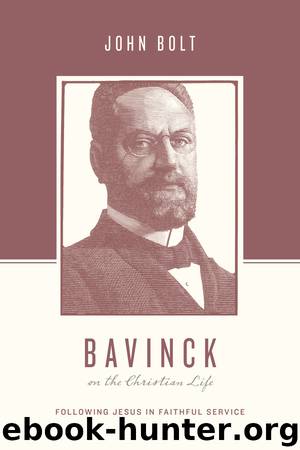Bavinck on the Christian Life: Following Jesus in Faithful Service by John Bolt

Author:John Bolt
Language: eng
Format: epub
Publisher: Crossway
Contours of a Christian Worldview
We have now considered the place of worldview in Bavinck’s understanding of the Christian life and seen how his conviction that worldview follows faith is characterized by a sense of trusting dependence on God’s faithfulness. The important human capacity for self-consciousness—our awareness of self, the world, and God—is pure gift; it is revealed to us. And with that we have the answers to the three worldview questions introduced at the beginning of this chapter: What is the relation between thinking and being? Between being and becoming? Between becoming and acting? Put more simply: Who am I? What is the world? What is my place and task within this world?45
To answer the first: Thought follows being and self-consciousness, and all thought must be measured by its fidelity to reality, by the way things really are. And because the Logos who created and ordered all things is also the Word who addresses us in revelation, our capacity to receive revelation—including the ability to use our small l logos or mind to discern the order of the world—gives us confidence that our perceptions are real and true. From this, we honor who we are, who God is, and our place in his world by being open to his revelation, to learning more about the world, to self-correction, and to humility and modesty in our claims. This is the part of Bavinck’s Christian view of the world that is often overlooked, and sadly neglected, by those who turn to the Dutch neo-Calvinist tradition for help on worldview matters.
As we now turn to the key elements of Bavinck’s Christian worldview, we must acknowledge the problem that sin introduces into the picture. Bavinck acknowledges that our self-knowledge and our knowledge of the world are distorted by sin. When it comes to knowing God, sin compounds the problem. In much the same way that we can come to know others only if they reveal themselves to us, so too we can know God only if he reveals himself to us. “A man must reveal himself, manifest himself by appearance, word, and act, so that we may somewhat learn to know him.” Similarly,
no knowledge of God is possible except that which proceeds from and by God (Matt. 11:27; 1 Cor. 2:10ff.). Earlier theology had an axiom for it: “What we need to understand about God must be taught by God himself, for this cannot be known except by the author himself.” The fact that the creature knows anything of God at all is solely due to God. He is knowable only because and insofar as he himself wants to be known.46
The human analogy breaks down, however, because our self-revelation is always problematic: “We often reveal ourselves in totally arbitrary ways and in spite of ourselves; we often manifest ourselves in character traits and peculiarities that are unknown to us. Sometimes our self-manifestation belies who we are—it is false, untrue, misleading.” And then, here is the difference: “But none of this is true of God.”
Download
This site does not store any files on its server. We only index and link to content provided by other sites. Please contact the content providers to delete copyright contents if any and email us, we'll remove relevant links or contents immediately.
The 5 Love Languages: The Secret to Love That Lasts by Gary Chapman(9815)
The Space Between by Michelle L. Teichman(6941)
Assassin’s Fate by Robin Hobb(6217)
Wiseguy by Nicholas Pileggi(5786)
Everything Happens for a Reason by Kate Bowler(4743)
Gerald's Game by Stephen King(4654)
Pillow Thoughts by Courtney Peppernell(4284)
A Simplified Life by Emily Ley(4162)
The Power of Positive Thinking by Norman Vincent Peale(4064)
Harry Potter and the Prisoner of Azkaban (Book 3) by J. K. Rowling(3360)
Resisting Happiness by Matthew Kelly(3341)
Girl, Wash Your Face by Rachel Hollis(3282)
Being Aware of Being Aware by Rupert Spira(3276)
The Secret Power of Speaking God's Word by Joyce Meyer(3220)
The Code Book by Simon Singh(3189)
More Language of Letting Go: 366 New Daily Meditations by Melody Beattie(3030)
Real Sex by Lauren F. Winner(3023)
Name Book, The: Over 10,000 Names--Their Meanings, Origins, and Spiritual Significance by Astoria Dorothy(2987)
The Holy Spirit by Billy Graham(2952)
